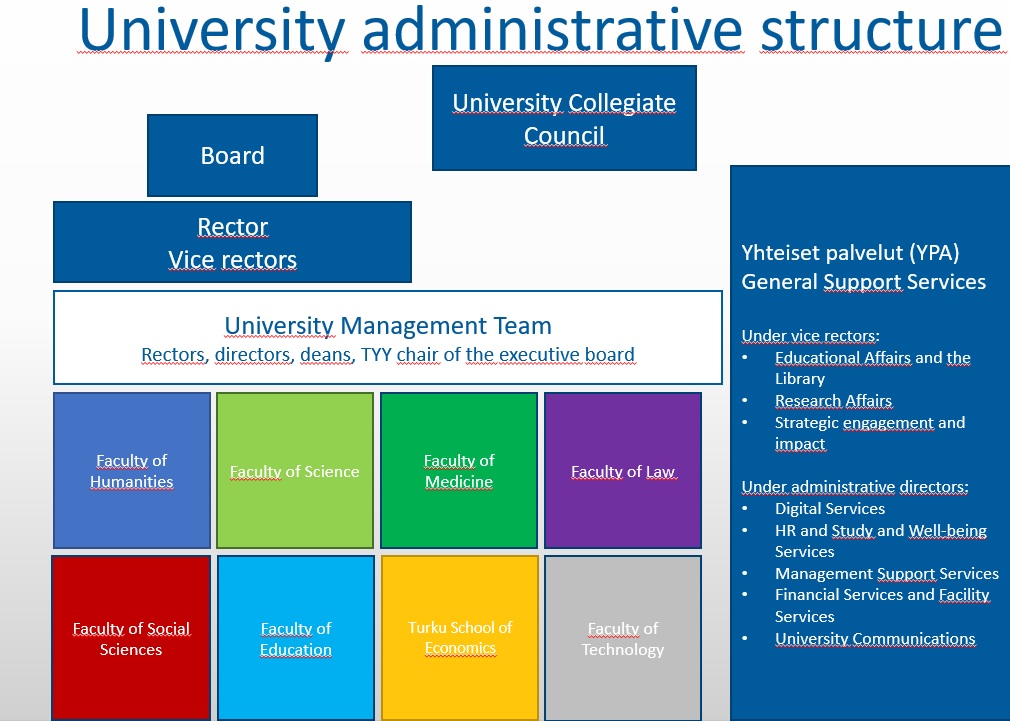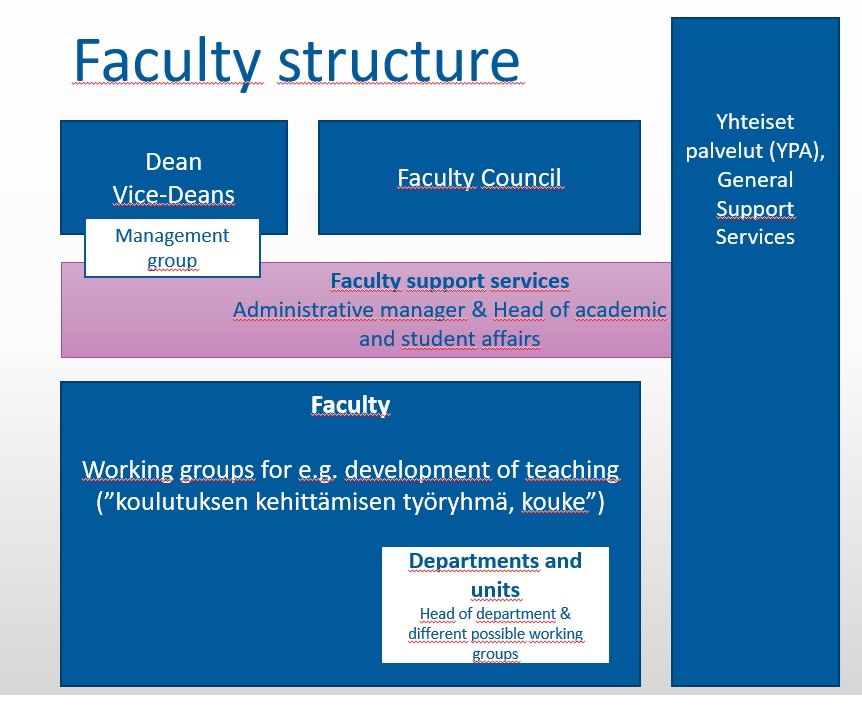Being a student representative
Students have representatives in the university administration, from the subjects to the University Collegiate Council and the University Board. The Collegiate Council and the Board are administrative bodies of a public university defined by the Universities Act (558/2009, Section 13), and the Faculty Councils are further regulated in the University of Turku Rules of Procedure. The rules also define the Academic Appeals Board, which handles, among other things, rectification requests related to the assessment of academic achievements (Section 44). In addition, the Board of the Centre for Language and Communication Studies (Kievi) has two student representative positions, and the University of Turku Library has four subject-specific advisory boards with student representation. In addition to these, faculties, departments and subjects may have other meetings, teams and working groups as needed.
The Student Union acts as the body preparing the elections for student representatives to the University Board, University Collegiate Council, Faculty Councils, Academic Appeals Board, Kievi Board and Library Advisory Boards. The TYY Executive Board also elects representatives to various administrative groups that cover the entire university. In other faculty and school level administrative bodies, the election of representatives is most often carried out in cooperation with the faculty/school administration and subject and faculty organisations.
Representation in the administrative bodies of the university
The University of Turku follows the principle of equal tripartite representation in the Board, Collegiate Council and Faculty Councils, i.e. professors, other university staff (the “middle group”) and students have an equal number of representatives in the administrative body. In addition, the Board has a number of members elected by the Collegiate Council who do not represent the university groups; they can be, for example, actors from society and business, organizations of sciences and arts within the university’s field of activity, or other expert organisations.
The term of office of student representatives on the University Board, University Collegiate Council and Faculty Councils is always two years. The term of office for other organs varies. Student representatives play a key role in bringing the perspectives and voices of students to the activities of the university community. As a student representative, you do not have to work alone: there is always at least one colleague with whom you can prepare for upcoming meetings. In addition, each faculty has its own coordinator who works with the faculty organization and student representatives - it is worth keeping in touch with other representatives of the faculty, and also with representatives of other faculties, in order to get a broader picture of what is happening in the university community. Material related to university decision-making can be found on the intranet for the University Board here, and documents from several other administrative bodies have been collected here.
According to TYY’s regulation on electing student representatives, eligibility is limited to individuals with the right to complete a bachelor’s degree, master’s degree, licentiate degree, or doctoral degree, or a specialist degree in medicine or in dentistry at the University of Turku. In addition, a prerequisite for eligibility is that the student has registered as attending. However, persons who are full-time employees of the university as defined by the University Regulations on Elections are not eligible.
University administrative structure


The remit of the University Collegiate Council
The Collegiate Council is the largest representative body in the university. Its foremost mission is to discuss issues that are important to the whole community and act as the community’s voice. The remit of the Collegiate Council includes deciding on the number of members in the University Board, the duration of the term of the board and its members and the remuneration of the Board chair and members; electing those members that do not represent the university personnel and students in the university board; to confirm the appointment of board members of the university personnel and students; appointing university auditors; confirming the financial statement and annual report of the university and deciding on the discharge of liability to the board members and the rector.
The remit of the University Board
As the highest executive organ of the university, the Board determines the foremost objectives of the university’s operations and finances, the strategy and management principle, elects the rector, decides on the action and financial plans and the budget of the university and prepares the annual financial statement, adopts the rules and regulations of the university, decides the operational structure of the university, suggest changes to the educational responsibilities and decides on the number of students to be admitted to the university.
The remit of the Faculty Councils
The Faculty Council is the highest executive organ of the faculty. The remit of the Faculty Councils includes developing education and research in the faculty, drafting proposals for plans of action and financial plans and annual budgets as well as deciding on the guidelines for the distribution of the resources allocated to the faculty; adopting the curricula; as well as drafting the proposal for the number of new students to be admitted annually into the faculty and deciding on the admission criteria.
Resignation from the position of student representative
You can always resign from your position by giving your own notice. The notice should be given at least to the party that appointed you, but preferably also to the chair and secretary of the organ. In the case of Faculty Councils, University Collegiate Council, Academic Appeals Board, Kievi board and Library Advisory Boards, the body making the appointment is TYY, and the contact person to whom the notice should be given is the specialist in academic affairs (tyy-kopoasiantuntija@utu.fi).
You must remember to give your notice of resignation in a situation where your eligibility to apply, i.e. the right to act as a student representative, ends; most often upon graduation or, for example, upon becoming a university employee other than as part of an internship that is part of your studies (at least 20 working hours per week, more precisely defined in the University Regulations on Elections). When a member resigns from the institution, their possible personal deputy member automatically becomes a full member. The TYY Executive Board formally notes the resignation and appoints a new deputy member at its meeting when the supplementary application period for the position is over. Supplementary applications are systematically held twice per semester.
Vocabulary and abbreviations
Bologna Process
The Bologna Process seeks to bring more coherence to higher education systems across Europe. The participating countries agree to:
- introduce a three-cycle higher education system consisting of bachelor’s master’s and doctoral studies
- ensure the mutual recognition of qualifications and learning periods abroad completed at other universities
- implement a system of quality assurance, to strengthen the quality and relevance of learning and teaching
Dean (dekaani)
The manager of the faculty’s operations. The Rector appoints the Dean from among the faculty’s professors for their own term of office after consultation with the Faculty Council.
Docent
The University of Turku Rules of Procedure, section 42: “The Rector may on application grant the title of Docent to a person who has comprehensive knowledge of their own field, a capacity for independent scholarly research work demonstrated through publications or in some other manner, and good teaching skills. The proposal to grant the title of Docent is made by the Faculty Council.
Dual model (duaalimalli)
The Finnish higher education system consists of universities and universities of applied sciences.
ECTS
“European Credit Transfer and Accumulation System”. The European study credit system. 60 ECTS credits are the equivalent of a full year of study or work.
Halloped
“Hallinnon opiskelijaedustaja” in Finnish. A general term used of student representative in the university administration.
Jory
“Johtoryhmä” (FI), “Management Group” (EN)
Karvi (FINEEC)
“The Finnish Education Evaluation Centre”. (FI Kansallinen koulutuksen arviointikeskus) An independent authority responsible for the national evaluation of education. Three key evaluation types are the quality audits of the higher education institutions, thematic evaluations and engineering degree programme reviews. More information in karvi.fi.
OKM
“Ministry of Education and Culture” (FI Opetus- ja kulttuuriministeriö)
OPH (EDUFI)
”Finnish National Agency for Education” (FI Opetushallitus). EDUFI is the national development agency responsible for early childhood education and care, pre-primary, basic, general and vocational upper secondary education as well as for adult education and training. Operates under the Ministry of Education and Culture.
OPS
“Curriculum”. (FI opetussuunnitelma). The cycle for curricula in UTU is three years. Curriculum contains the core information about the degree education (degree structure, the learning outcomes of education and courses, the contents of teaching, and description of the modes of study and evaluation of learning). The syllabus (FI opetusohjelma) contains exact details of the realization and schedule of teaching.
Unifi
The Council of Rectors of Finnish Universities. A forum for co-operation between the Finnish universities.
vipunen.fi
The education administration’s reporting portal operated jointly by the Ministry of Eduation and Culture and the Finnish National Agency for Education. Provides statistics among others about applicants and selected candidates, study progress, university personnel, student feedback, and career monitoring.